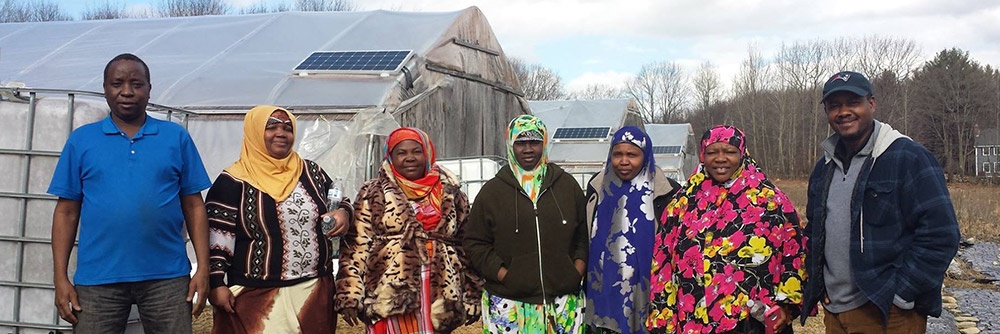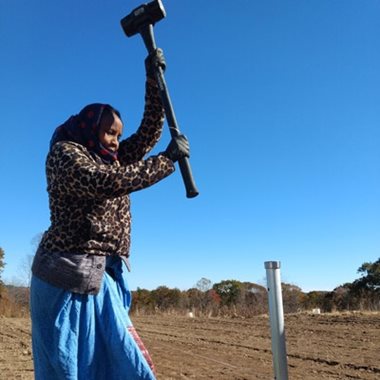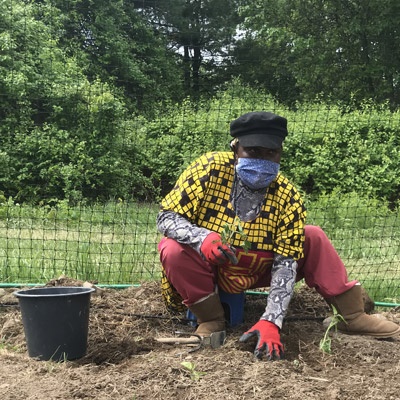When the new residents came to Manchester, New Hampshire – from Nepal, from Somalia, from Sudan, from Bhutan – they wanted to farm, growing food that would allow them to be self-sufficient in their new home. Some of them lived in apartments, with no gardening space. The Organization for Refugee and Immigrant Success (ORIS) found them that space. And since 2011, farmers have grown and sold crops through Fresh Start Farms.
But they didn't have a place to wash and package their produce. They didn't have a place to store it.
Meanwhile, a small brick building on Spruce Street in Manchester, New Hampshire, stood empty. It had been empty for years. Robert Tourigny, executive director of NeighborWorks Southern New Hampshire, didn't know what he wanted it to be. But he knew what he didn't want it to be, and that was a start.
"We set our sights on that building years ago, because it had become so problematic,"he says. "There was prostitution. There was gambling. It was just a bad place. We have 98 apartments in that neighborhood."
The section of downtown Manchester was in one of the lowest income areas on the census tracks in Manchester, Tourigny says. "I was afraid someone would buy it at auction and turn it into a vape shop or worse. It was the last thing the neighborhood needed. I went to the board seeking authority to acquire the property. I said, ‘We'll figure out the right use once we get site control.'”
He tried repeatedly to acquire the building from various owners and entities. Finally, the county took over and auctioned the property to recover back taxes. NeighborWorks Southern New Hampshire won the building at auction for $100,000 in May of 2019. As part of last year's NeighborWorks Week, Tourigny put up a board with a bunch of sticky notes and a picture of the property. He asked: "What would you want to see here?”
The suggestions varied. Bar? Deli? Tourigny believed that whatever it was, it would need to benefit the neighborhood. Late last summer, his staff went to a ribbon cutting for Fresh Start Farms' Global Market and that's where they had the first discussion about a market location in the center of the city. Local, immigrant farmers would be able to package and sell their fresh produce.
 The program would have huge benefits for the neighborhood, Tourigny says. And the building would go "from being a liability in the neighborhood to what's going to be a great asset.”
The program would have huge benefits for the neighborhood, Tourigny says. And the building would go "from being a liability in the neighborhood to what's going to be a great asset.”
Owning commercial real estate is still not in the plans for the NeighborWorks organization, he says, and it is his hope that ORIS will eventually purchase the building that, for now, falls between NeighborWorks SNH's community engagement and real estate development lines of business. "We have a huge presence in the neighborhood and that was an important reason for us to do everything we could,"he says.
ORIS's lease started on June 1. Their first produce CSA pickup came two days later. Both Tourigny and Erica Brooks, community building manager, signed up. The market will be able to be open all year, Brooks says, and they just put the last touches on a mural for the back of the building, showcasing the farmers who work the land. Most of them are women.
"We knew from a retail standpoint that there weren't a lot of food sources in that neighborhood,"Tourigny says. A few years ago, the health department tried to encourage stores that sold beer and cigarettes to also sell bananas and apples. But healthy food never became a significant presence. "To have someone bring in fruit and vegetables is a huge, huge plus.”
The Center City in Manchester is one of the most diverse neighborhoods in New Hampshire. Immigrants helped diversity it, as residents and as small business owners, Brooks says. "They own barbershops, restaurants, corner stores and food trucks. This reflects people moving here and not leaving; they stay and make a home."And, of course, they farm.
NeighborWorks Southern New Hampshire has been able to provide affordable housing units in the neighborhood, offering homeownership classes or financial literacy education to all tenants. Brooks says the Hub on Spruce "brings healthy food to our tenants and community and is a walkable space for many of ORIS' farmers who live in the neighborhood as well.”
A fresh start
ORIS is an immigrant-led organization that formed in 2008. The organization is focused on resettlement services for new Americans, and Fresh Start Farms is one of their flagship projects."A lot of the people that have moved here were all farmers back home,"says Jameson Small, program manager for Fresh Start Farms. "They wanted to continue to farm,"he says. But land was expensive. The climate was different. They needed assistance.
 ORIS provides technical and marketing assistance to help the farmers succeed. Currently, they work with 23 farmers. The new hub will allow them to offer storage and refrigeration, a boon for farmers who in the past had no place to store items if they didn't sell immediately at a local farmer's market. The hub will also allow them to take on more wholesale accounts.
ORIS provides technical and marketing assistance to help the farmers succeed. Currently, they work with 23 farmers. The new hub will allow them to offer storage and refrigeration, a boon for farmers who in the past had no place to store items if they didn't sell immediately at a local farmer's market. The hub will also allow them to take on more wholesale accounts. Collectively, Small says, all 23 farmers did $100,000 combined in business last year; the average farmer made $2,300 in profit. "That's not sustainable for them,"he says. And more want to farm. To make room, they need to improve marketability. To make room, they need a larger market, Small says.
They began expanding several months ago with a mobile market, bringing food to low-income seniors in New Hampshire. A central hub will help them with that program, too, he says. "We're extremely optimistic that it's going to do really well.”
In December, Fresh Start built an online site to take orders for their community-supported agriculture (CSA). The goal was to have 65 people signed up by the end of May. When COVID hit and people became worried about going to grocery stores, their numbers soared. "We had to cap it at 200,"Small says.
When social distancing allows, they'll add a retail component to the hub, where people can walk in and buy food. But for now, they're using it as curbside delivery for the CSA. Small says Somalis brought over seed for African corn and eggplants, amaranth greens and more. Indian farmers brought bitter melon. They also grow potatoes, cucumbers and items more familiar to the American market.
Ninety percent of the farmers are women. "For a lot of them, this is an awesome opportunity to get out run their own business,"Small says. Some work at farmer's markets, but others have issues with transportation or language barriers and will rely on the CSA.
"It's a big frontier,"Small says. "They're learning new markets and adapting their style to that."
Another benefit of having the space, a U.S. Department of Agriculture-certified facility, is that they can also create food packages under the Coronavirus Aid, Relief, and Economic Security act (CARES), are dispersed to the New Hampshire Foodbank and others in the state.
With restaurants and schools closed, markets for farmers in the state have shrunk, he says. Beginning June 30, the hub will be able to package 200 boxes of fruits and vegetables. "It's temporary, but it will make a massive difference during the launch year of this new hub,"he says. The produce will come from Fresh Start farmers and other farmers in the northeast.
 In the future, he says, they hope to support any type of local food grown in the region, including apples and strawberries, dairy and meats.
In the future, he says, they hope to support any type of local food grown in the region, including apples and strawberries, dairy and meats. Small says NeighborWorks Southern New Hampshire has been flexible in helping them figure out a payment schedule and has offered to use payments as equity. "It's a unique situation. The impact is already massive. We're really grateful and thankful.”
Romi Hall, director of Healthy Homes and Communities for NeighborWorks America, says NWSNH "wonderfully demonstrates how community developers are important players in creating healthier communities."The organization organized and acted to purchase the building, she says, and filled the space with something the community needed. "They transformed an underutilized site into a place where health, community and economic opportunity are centered. They turned what had been a vacant building into a healthy, viable asset that can set the stage for more good community work to come."

